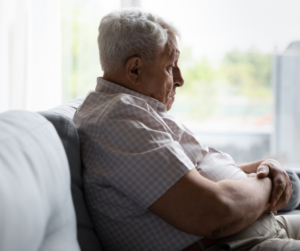Signs of Loneliness In Seniors You Shouldn’t Ignore
 If your senior parent is living on their own, one of the risks to their health that you should be concerned about is loneliness. Seniors living alone often are chronically lonely, which can affect their physical and mental health.
If your senior parent is living on their own, one of the risks to their health that you should be concerned about is loneliness. Seniors living alone often are chronically lonely, which can affect their physical and mental health.
Even if you live close enough to visit your senior parent often, they need more social interaction than spending time with you. Seniors need daily social engagement to be healthy and to develop a sense of purpose.
Companion care at home is a great way to make sure that your senior parent is getting the kind of regular social interaction they need to keep loneliness at bay. If your senior parent has companion care at home, a companion they like and trust will visit daily for a few hours to just spend time with them.
Together, the companion and your senior parent can play board games or card games, watch TV, make crafts, listen to music, read books, and do other social activities. They can share meals and conversations. Getting regular visits from a companion will give your senior parent a reason to get up each day.
Your senior parent may not want to tell you that they are lonely because they don’t want you to feel guilty or feel like you need to visit more. So you need to watch for signs like this, which signal that your senior parent is lonely and could benefit from companion care at home:
Withdrawal from Social Activities
If your parents used to enjoy going out, talking with friends, or participating in hobbies but now avoid them, this could be a sign of loneliness. They may decline invitations, stop attending church or community events, or avoid phone calls. Isolation often leads to loneliness, and without social interaction, their mood and health may decline.
Changes in Mood or Behavior
Lonely seniors may seem sad, anxious, or easily irritated. If your parent is more emotional than usual, complains about feeling “down,” or seems uninterested in life, they may be struggling with loneliness. Pay attention to mood swings, loss of motivation, or expressions of hopelessness, as these could be signs of deeper emotional distress.
Neglecting Personal Care and Home Maintenance
When seniors feel lonely, they may lose interest in taking care of themselves or their living space. If your parent is wearing the same clothes for days, skipping showers, or not keeping up with household chores, loneliness may be a factor. A lack of motivation to maintain daily routines can be a warning sign that they are feeling isolated and unmotivated.
Increased Health Complaints
Loneliness can lead to physical symptoms such as headaches, body aches, or trouble sleeping. If your parent frequently complains about feeling unwell but has no clear medical diagnosis, loneliness may be affecting their health. Chronic loneliness can weaken the immune system, increase stress, and raise the risk of heart disease and high blood pressure.
Excessive Time Watching TV or Using Technology
If your parent spends most of their time watching TV or browsing the internet, they may be using technology as a way to fill the gap of human interaction. While some screen time is normal, excessive use can indicate that they feel disconnected from real social interactions. If they are constantly online but rarely talk to friends or family, loneliness could be the reason.
